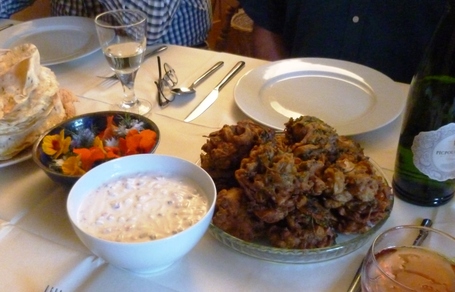 Martin's Onion Bhajis - nearing perfection!
Martin's Onion Bhajis - nearing perfection! 'However I attack the keys, the tone is always even. It's true, he won't part with a pianoforte like this for under 300 florins, but the effort and labour that he expends on it can't be paid for. A particular feature of his instruments is their escape action. Not one maker in a hundred bothers with this. But without escape action it's impossible for a pianoforte not to produce a clattering sound or to go on sounding after the note has been struck; when you strike the keys, his hammers fall back again the moment they hit the strings, whether you hold down the keys or release them. He told me that only when he's finished making a piano like this does he sit down and try out all the passagework, runs and leaps, and, using a shave, works away at the instrument until it can do everything. For he works only to serve the music, not just for his own profit, otherwise he'd be finished at once.
He often says that if he weren't such a great music lover and didn't have some slight skill on the instrument, he'd long since have run out of patience with his work; but he loves an instrument that never lets the player down and that will last.'
When I read this letter I made a note at the back of the book (reprehensible habit, my husband has chided, writing in books): 'P 186 Stein - like my Martin, a maker of good things!'
I have in the past accused my husband of being a perfectionist, but in truth, it is, more than that, an essential part of his being that he loves to make things as good as he can get them, while acknowledging that there is a point at which he is happy to sit back and say to himself - that's good enough.
He trained as an actor at the Royal Academy of Dramatic Art, but eventually, like so many actors (they say only 3.5% of actors work are lucky enough to be in full-time work), that work began to dry up. Over the years we have been together, I have seen him work at all kinds of things with an increasing capacity for stamina and perseverance, often with no more instruction than the careful, thoughtful study of publications like The Reader's Digest Complete DIY Manual or Geoff Hamilton's Organic Gardening!
In our first home he built shelving and cupboards. In the next he replaced a whole floor of wood-wormed planks, built kitchen units, and dug out a concrete bomb-shelter that had been buried in our Hackney kitchen. When we moved to Sussex, he cleared, designed and laid out two gardens, one with a huge vegetable patch, where he grew brassicas, legumes, roots, sweet-corn, squashes. In our current home he has renovated virtually the whole house, and recently re-pointed the gable end of the external brickwork, laid some beautiful brick paths and low walls. And when I look at our son, now expecting his own child, I see someone who shows the tangible benefits of having received constant good fathering.
For the last few years I have also seen my husband's energies turned to something flowering later in life: writing. Again, the same dogged determination and love of creating, polishing and getting something as good as possible, is being applied to the art of writing what he likes to think of ripping yarns. He doesn't aspire to be a great writer, though he loves to read them (Charles Portis is a current joy!) - but there's nothing more gratifying to him than a new review or communication from a reader who has throroughly enjoyed one of his books.
Lacking interest from the established publishing world, and even most book-sellers, we have published Niedermayer & Hart and Roadrage under our own imprint, Odd Dog Press. Consequently, even with the help of the internet, no mass-marketing means that it is a struggle, in the face of an ever-growing book glut, to encourage readers to nudge the books onto their book-pile.
But here's where the perseverance comes in - Martin is writing the sequel to Niedermayer & Hart, and labouring hard at making it something that the former's fans will enjoy reading. Working to serve the writing.
And in the meantime, also finding time to perfect his recipe for onion bhajis (see picture)!

 RSS Feed
RSS Feed
